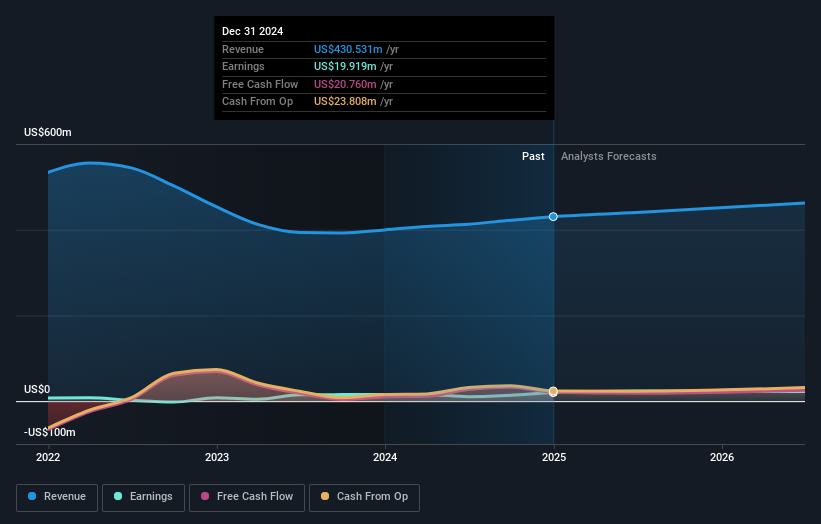Institutional investors in Flexsteel Industries, Inc. (NASDAQ:FLXS) lost 10% last week but have reaped the benefits of longer-term growth
Key Insights
- Institutions' substantial holdings in Flexsteel Industries implies that they have significant influence over the company's share price
- The top 10 shareholders own 51% of the company
- 35% of Flexsteel Industries is held by insiders
A look at the shareholders of Flexsteel Industries, Inc. (NASDAQ:FLXS) can tell us which group is most powerful. The group holding the most number of shares in the company, around 50% to be precise, is institutions. In other words, the group stands to gain the most (or lose the most) from their investment into the company.
No shareholder likes losing money on their investments, especially institutional investors who saw their holdings drop 10% in value last week. However, the 19% one-year returns may have helped alleviate their overall losses. We would assume however, that they would be on the lookout for weakness in the future.
Let's delve deeper into each type of owner of Flexsteel Industries, beginning with the chart below.
Check out our latest analysis for Flexsteel Industries

What Does The Institutional Ownership Tell Us About Flexsteel Industries?
Many institutions measure their performance against an index that approximates the local market. So they usually pay more attention to companies that are included in major indices.
As you can see, institutional investors have a fair amount of stake in Flexsteel Industries. This suggests some credibility amongst professional investors. But we can't rely on that fact alone since institutions make bad investments sometimes, just like everyone does. When multiple institutions own a stock, there's always a risk that they are in a 'crowded trade'. When such a trade goes wrong, multiple parties may compete to sell stock fast. This risk is higher in a company without a history of growth. You can see Flexsteel Industries' historic earnings and revenue below, but keep in mind there's always more to the story.

Hedge funds don't have many shares in Flexsteel Industries. Dimensional Fund Advisors LP is currently the largest shareholder, with 7.2% of shares outstanding. In comparison, the second and third largest shareholders hold about 6.7% and 6.3% of the stock. In addition, we found that Derek Schmidt, the CEO has 3.9% of the shares allocated to their name.
We also observed that the top 10 shareholders account for more than half of the share register, with a few smaller shareholders to balance the interests of the larger ones to a certain extent.
Researching institutional ownership is a good way to gauge and filter a stock's expected performance. The same can be achieved by studying analyst sentiments. There is some analyst coverage of the stock, but it could still become more well known, with time.
Insider Ownership Of Flexsteel Industries
The definition of an insider can differ slightly between different countries, but members of the board of directors always count. The company management answer to the board and the latter should represent the interests of shareholders. Notably, sometimes top-level managers are on the board themselves.
Insider ownership is positive when it signals leadership are thinking like the true owners of the company. However, high insider ownership can also give immense power to a small group within the company. This can be negative in some circumstances.
Our information suggests that insiders maintain a significant holding in Flexsteel Industries, Inc.. Insiders have a US$79m stake in this US$226m business. This may suggest that the founders still own a lot of shares. You can click here to see if they have been buying or selling.
General Public Ownership
With a 15% ownership, the general public, mostly comprising of individual investors, have some degree of sway over Flexsteel Industries. While this size of ownership may not be enough to sway a policy decision in their favour, they can still make a collective impact on company policies.
Next Steps:
It's always worth thinking about the different groups who own shares in a company. But to understand Flexsteel Industries better, we need to consider many other factors. For example, we've discovered 3 warning signs for Flexsteel Industries that you should be aware of before investing here.
Ultimately the future is most important. You can access this free report on analyst forecasts for the company.
NB: Figures in this article are calculated using data from the last twelve months, which refer to the 12-month period ending on the last date of the month the financial statement is dated. This may not be consistent with full year annual report figures.
Have feedback on this article? Concerned about the content? Get in touch with us directly. Alternatively, email editorial-team (at) simplywallst.com.
This article by Simply Wall St is general in nature. We provide commentary based on historical data and analyst forecasts only using an unbiased methodology and our articles are not intended to be financial advice. It does not constitute a recommendation to buy or sell any stock, and does not take account of your objectives, or your financial situation. We aim to bring you long-term focused analysis driven by fundamental data. Note that our analysis may not factor in the latest price-sensitive company announcements or qualitative material. Simply Wall St has no position in any stocks mentioned.
 Wall Street Journal
Wall Street Journal